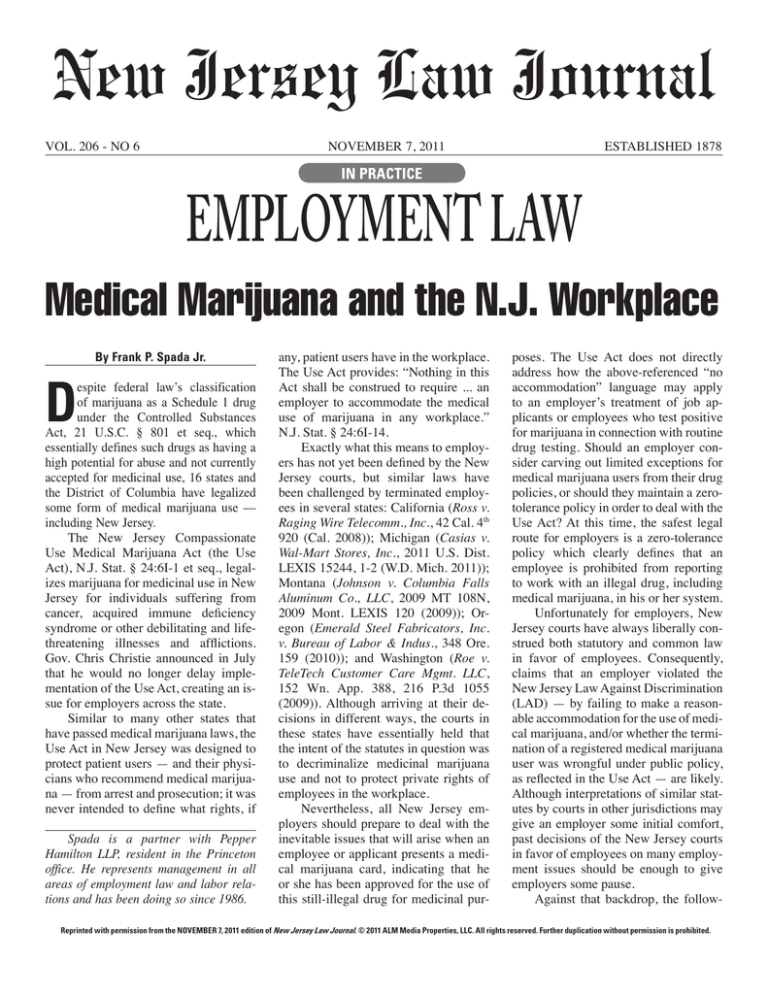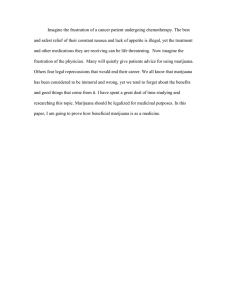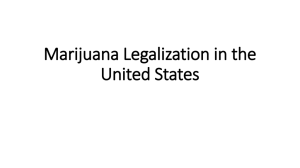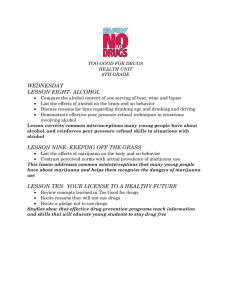
New Jersey Law Journal
VOL. 206 - NO 6
NOVEMBER 7, 2011
ESTABLISHED 1878
EMPLOYMENT LAW
Medical Marijuana and the N.J. Workplace
By Frank P. Spada Jr.
D
espite federal law’s classification
of marijuana as a Schedule 1 drug
under the Controlled Substances
Act, 21 U.S.C. § 801 et seq., which
essentially defines such drugs as having a
high potential for abuse and not currently
accepted for medicinal use, 16 states and
the District of Columbia have legalized
some form of medical marijuana use —
including New Jersey.
The New Jersey Compassionate
Use Medical Marijuana Act (the Use
Act), N.J. Stat. § 24:6I-1 et seq., legalizes marijuana for medicinal use in New
Jersey for individuals suffering from
cancer, acquired immune deficiency
syndrome or other debilitating and lifethreatening illnesses and afflictions.
Gov. Chris Christie announced in July
that he would no longer delay implementation of the Use Act, creating an issue for employers across the state.
Similar to many other states that
have passed medical marijuana laws, the
Use Act in New Jersey was designed to
protect patient users — and their physicians who recommend medical marijuana — from arrest and prosecution; it was
never intended to define what rights, if
Spada is a partner with Pepper
Hamilton LLP, resident in the Princeton
office. He represents management in all
areas of employment law and labor relations and has been doing so since 1986.
any, patient users have in the workplace.
The Use Act provides: “Nothing in this
Act shall be construed to require ... an
employer to accommodate the medical
use of marijuana in any workplace.”
N.J. Stat. § 24:6I-14.
Exactly what this means to employers has not yet been defined by the New
Jersey courts, but similar laws have
been challenged by terminated employees in several states: California (Ross v.
Raging Wire Telecomm., Inc., 42 Cal. 4th
920 (Cal. 2008)); Michigan (Casias v.
Wal-Mart Stores, Inc., 2011 U.S. Dist.
LEXIS 15244, 1-2 (W.D. Mich. 2011));
Montana (Johnson v. Columbia Falls
Aluminum Co., LLC, 2009 MT 108N,
2009 Mont. LEXIS 120 (2009)); Oregon (Emerald Steel Fabricators, Inc.
v. Bureau of Labor & Indus., 348 Ore.
159 (2010)); and Washington (Roe v.
TeleTech Customer Care Mgmt. LLC,
152 Wn. App. 388, 216 P.3d 1055
(2009)). Although arriving at their decisions in different ways, the courts in
these states have essentially held that
the intent of the statutes in question was
to decriminalize medicinal marijuana
use and not to protect private rights of
employees in the workplace.
Nevertheless, all New Jersey employers should prepare to deal with the
inevitable issues that will arise when an
employee or applicant presents a medical marijuana card, indicating that he
or she has been approved for the use of
this still-illegal drug for medicinal pur-
poses. The Use Act does not directly
address how the above-referenced “no
accommodation” language may apply
to an employer’s treatment of job applicants or employees who test positive
for marijuana in connection with routine
drug testing. Should an employer consider carving out limited exceptions for
medical marijuana users from their drug
policies, or should they maintain a zerotolerance policy in order to deal with the
Use Act? At this time, the safest legal
route for employers is a zero-tolerance
policy which clearly defines that an
employee is prohibited from reporting
to work with an illegal drug, including
medical marijuana, in his or her system.
Unfortunately for employers, New
Jersey courts have always liberally construed both statutory and common law
in favor of employees. Consequently,
claims that an employer violated the
New Jersey Law Against Discrimination
(LAD) — by failing to make a reasonable accommodation for the use of medical marijuana, and/or whether the termination of a registered medical marijuana
user was wrongful under public policy,
as reflected in the Use Act — are likely.
Although interpretations of similar statutes by courts in other jurisdictions may
give an employer some initial comfort,
past decisions of the New Jersey courts
in favor of employees on many employment issues should be enough to give
employers some pause.
Against that backdrop, the follow-
Reprinted with permission from the NOVEMBER 7, 2011 edition of New Jersey Law Journal. © 2011 ALM Media Properties, LLC. All rights reserved. Further duplication without permission is prohibited.
2
NEW JERSEY LAW JOURNAL, NOVEMBER 7, 2011
ing suggestions should be considered by
employers and their attorneys in regard
to the drafting and implementation of
workplace policies concerning drug use.
Employers must notify applicants in
writing of their medical marijuana policy
at the time of application and ensure that
the employer’s position on medical marijuana use is clearly stated in its drug and
alcohol testing policy.
In a situation where an applicant offers that he or she is a registered medical
marijuana user, the employer should take
care not to inquire about the disability for
which the medical marijuana has been
prescribed. An employer is not permitted
to ask about the applicant’s underlying
condition. Clearly, questions concerning
the use of medical marijuana or any other
drug are not permitted. Any subsequent
adverse action would most likely result
in allegations of disability discrimination
against the employer under both state and
federal law.
Consider your company’s geographic
footprint, because medical marijuana laws
may vary from state to state; currently,
most states do not have a medical marijuana law. This consideration is less important if the employer chooses to apply
a zero-tolerance policy for all locations
which would effectively prohibit any illicit drug use, including those employers
who operate under federal contracts and/
or in industries regulated by federal law
like trucking or nuclear energy.
Safety-sensitive, financial or confidential positions should be targeted. For
employers who may choose something
other than a zero tolerance policy, make
sure your drug workplace policy for
safety-sensitive personnel who operate
equipment or vehicles, perform maintenance on equipment and vehicles, or
those who work with financial or other
confidential information explicitly prohibits the use of any illegal drug or alcohol while working. In this circumstance,
an employer must have legitimate busi-
ness reasons for treating these employees
differently. Failure to be consistent will
expose the employer to significant liability and result in claims of discrimination
from those employees who feel they have
been unfairly selected for routine or random drug testing because of a protected
class or activity.
Clearly and effectively communicate
policies. As previously stated, an employer should specifically state the company’s
position on medical marijuana use for job
applicants and existing employees. Such
a communication should be in writing and
disseminated to all employees to provide
notice of the expectations of the employer. Further, supervisors should be trained
to understand and consistently apply this
policy throughout the company’s workplace. These policies should be reviewed
and updated as applicable state or federal
laws change. Employers should expect
arguments as to why medical marijuana
is targeted while other legally prescribed
drugs that might impair an employee’s
ability to perform his or her job functions are permitted. Proponents for the
accommodation of medical marijuana
use in the workplace argue that a positive
drug test for marijuana does not establish
impairment, but only confirms that there
are marijuana (THC) metabolites above
a certain cutoff level in an individual’s
system. Accordingly, proponents maintain that employers should treat medical
marijuana no differently than other prescription medications permitted by an
employer in the workplace. An employer
should avoid the use of the term “impairment” in its drug policies or risk falling
into this trap.
Keep sensitive information private.
As with any medical information, make
sure you adopt appropriate measures
for maintaining the confidentiality of an
employee’s/applicant’s status as an approved medical marijuana recipient.
Examine leave policies under the
federal Family and Medical Leave Act
206 N.J.L.J. 494
(FMLA) and the New Jersey Family
Leave Act (NJFLA). An employee who
is a registered medical marijuana user
is not yet automatically entitled to leave
under the FMLA. Of course, the particular debilitating condition that qualifies an
employee under the Use Act will almost
always qualify that employee for leave
as a serious health condition under the
FMLA. Similarly, the illness of an employee’s family member that permits the
use of medical marijuana will most likely
provide eligibility for leave under the NJFLA. Some employers presented with a
medical marijuana card prior to drug testing may choose to place the employee on
disability leave or the FMLA to allow
the employee time to resolve his or her
medical condition. This may be a workable remedy if the use of medical marijuana is short-lived, as in a chemotherapy
treatment circumstance that is successful.
Unfortunately, because marijuana (THC)
metabolites remain in a user’s system
much longer than evidence of other drugs,
an employee on leave may still test positive prior to a return to work even though
current use may have ceased.
Employers may not have to accommodate medical marijuana use under the
Use Act but they will most likely have
to accommodate the disability that led to
the physician’s recommendation of medical marijuana, assuming the performance
of the position’s essential functions and
absent any undue hardship justification.
The New Jersey LAD and the new Americans with Disabilities Act regulations
are quite broad and require an interactive
process and potential accommodations
for a plethora of medical conditions. As
an employer, make certain your policies
and their enforcement clearly reflect that
any adverse employment actions taken
are not because of an employee’s disability, but for a clear violation of your drug
and alcohol policies that are in writing
and were properly noticed, disseminated
and understood.





